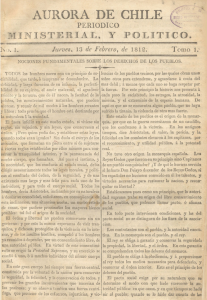
The Wars of Independence included the participation of people from various walks of life. Religious leaders played an important role on both sides of the conflict. One religious leader, Fray Camilo Henríquez, took on an active role for the independence of Chile.
Fray Camilo Henríquez (1769-1825) was born in Valdivia, Chile but finished his education in Lima to enter the religious order. Even in his early days, he was caught by the Inquisition for the possession of banned books. He cultivated antimonarchy and republican ideas, which he spread upon returning to Chile in 1810. He shared his ideas in newspapers, speeches, and sermons. One of his most well-known essays, “Nociones Fundamentales sobre los derechos de los pueblos” (Fundamental Notions of the Rights of Peoples) was published in 1812 in the first Chilean newspaper, Aurora de Chile.

In his essay, “Nociones Fundamentales sobre los derechos de los pueblos,” Henríquez explained the relationship between a monarchial government and its people, while delegitimizing the Spanish crown in the process. He mentioned keywords like “liberty,” “free,” “equal,” and “happiness,” that reflected republican ideas. He saw the relationship between monarchs and the people as a “social pact or alliance” where people obey and maintain order while the king guarantees “safety, property, liberty, and order.” He argued that this was not happening with the Spanish rule over Chile. He compared Spanish rule to Visigoth kings who were only “captains of a conquering people.” Further, he contended that “the prince is not an owner of the kingdom free to sell, bequeath, and divide it as he sees fit.” He also referred to the constitution and how people have a right to change it as they see fit. Ultimately, his goal was to enlighten the public on these ideas and rights as he asserted, “Have no doubt: ignorance of these rights keeps the chains of slavery intact.” His final plea was when he expressed his hope that “the Aurora de Chile could contribute in some way to the enlightenment of my compatriots.” It is clear that Henríquez did not want the people to be passive subjects under the Spanish crown, thereby, contributing to the independence cause in Chile.
While Fray Camilo Henríquez’s ideas may be considered progressive for the time, they would endure as Chile would achieve independence and enter into the next phase of republicanism. Today Henríquez is known as one of the most prominent Chilean priests, journalists, and revolutionaries from the period due to his active role during the fight for Chilean independence.
Translations from the English version of this document found in The Chile Reader: History, Culture, Politics.
Works Cited:
Henríquez, Camilo. “A Revolutionary Journalist.” In The Chile Reader: History, Culture, Politics, 129–32. Latin America Readers. Durham: Duke University Press, 2014.
Hutchison, Elizabeth Q., Thomas Miller Klubock, Nara B. Milanich, and Peter Winn, eds. The Chile Reader: History, Culture, Politics. Latin America Readers. Durham: Duke University Press, 2014.
Memoria Chilena: Portal. “Aurora de Chile : periódico ministerial, y político. Santiago de Chile : Impr. de este Superior Gobierno, por los señores Samuel B. Johnston, Guillermo H. Burbidge y Simon Garrison, 1812-1813. 2 v. Tomo I, no 1 (13 febr. 1812),” February 13, 1812. http://www.memoriachilena.gob.cl/602/w3-article-99216.html.
Memoria Chilena: Portal. “Camilo Henríquez (1769-1825).” Accessed April 28, 2020. http://www.memoriachilena.gob.cl/602/w3-article-564.html.
Memoria Chilena: Portal. “Camilo Henríquez, hacia 1813,” 1813. http://www.memoriachilena.gob.cl/602/w3-article-69539.html.
By Emily Beuter
